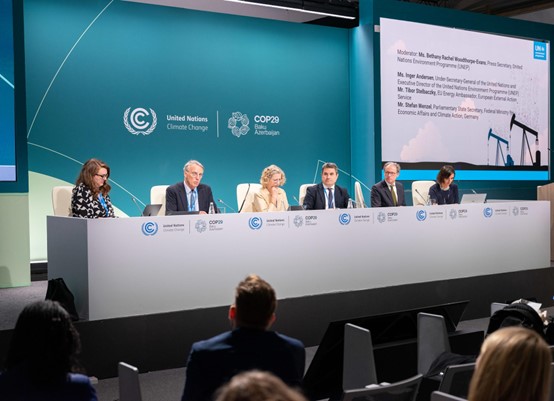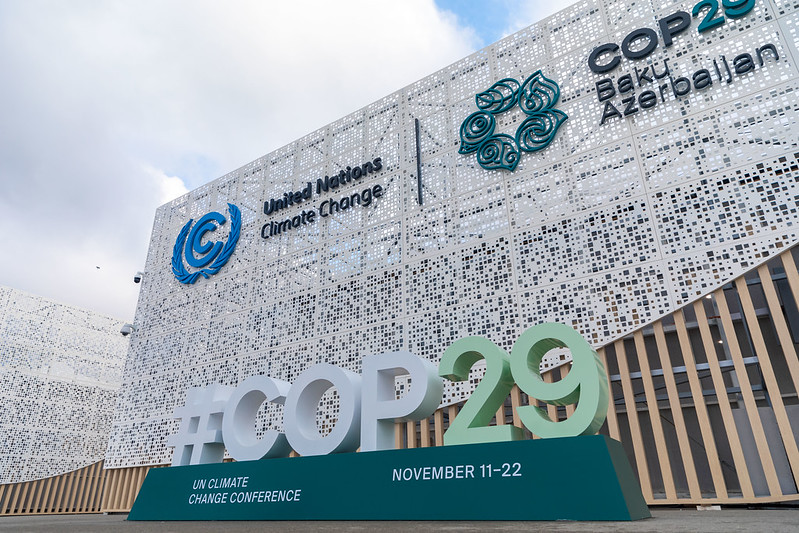This Blog is part of a series on COP29. The Conference of the Parties (COP) has become the focal point for global climate action, despite ongoing debates and skepticism. In this three-part series, we’ll examine COP29, focusing on climate diplomacy, finance, and the energy sector.
A blog by Ruben Krebs.
EU’s Climate Ambitions and Fossil Path-dependency Risks
Energy-related discussions at COP29 have once again spotlighted the urgent need for a transformative shift in the global energy sector, with the EU playing a key role in the debate: The EU reaffirmed its commitment to achieving climate neutrality by 2050 and a 55% reduction in net greenhouse gas emissions (GHG) by 2030. The proposed intermediate goal of a 90% reduction by 2040 emphasizes the EU’s ambition in GHG reductions, but challenges persist. A critical issue raised at the conference is the risk of overbuilding gas power plants in Europe, potentially locking in fossil fuel dependency for decades and undermining climate targets.
Innovations and Partnerships to Tackle Fossil Fuel Dependence
To combat such risks, significant innovations and partnerships were highlighted. The Methane Abatement Partnership Roadmap, launched by the EU, aims to drastically reduce methane emissions through global collaboration with NGOs, international organizations, and development banks. Initiatives such as Utilities for Net Zero emphasize the need to decarbonize utilities while maintaining energy affordability and security as scalable pathways for renewable energy integration. Another highlight was the role of advanced grid storage technologies, which could enable greater penetration of clean energy across Europe. As such, storage solutions are critical for accommodating fluctuating renewable energy supplies and ensuring grid reliability.
Hydrogen at the Heart of the Energy Transition
Hydrogen also took center stage, with Hydrogen Europe announcing its alignment with the newly unveiled Hydrogen Declaration at COP29. This declaration underscores the need to scale renewable and clean hydrogen production as well as infrastructure as a cornerstone of the clean energy transition. Coupled with the EU’s efforts, these developments mark a concerted push toward reducing reliance on fossil fuels while fostering innovation in renewable energy technologies.

Global Efforts
Beyond EU commitments, several global initiatives address the pressing need for a worldwide energy transition. The Beyond Oil and Gas Alliance (BOGA) is a coalition of governments and stakeholders dedicated to phasing out oil and gas production. The European Commission has partnered with BOGA to facilitate a transition away from fossil fuels. Furthermore, IRENA was advocating global partnerships to accelerate renewable energy adoption at COP29, emphasizing the importance of collaboration to strengthen climate action through scaling up renewable energy deployment worldwide. The Teramed Initiative, focusing on decarbonizing energy-intensive industries like steel and cement, marks another effort by Mediterranean countries to take leadership in pioneering sector-specific solutions. These efforts are well placed, as a recent poll by the Global Renewables Alliance found overwhelming voters’ support for clean energy expansion across ten leading economies, including in six EU member states.
Setbacks and Geopolitical Hurdles
However, there have also been setbacks: COP29 exhibited a lack of new and robust agreements on fossil fuels and energy storage targets, as the proposed targets for 1500 GW energy storage and a grid expansion of 25 million km (each year by 2030) failed to secure universal consensus. Whereas at COP28, nations committed to transitioning away from fossil fuels, Saudi Arabia resisted reaffirming this pledge at COP29 by employing delaying tactics and blocking maneuvers. This has raised concerns about potential drawbacks on commitments to reduce fossil fuel dependence, as a draft-text to reaffirm the transition pledge also included “transitional fuels”, which possibly includes fossil gas. Amid these developments, geopolitical tensions have added further complexity. Azerbaijan’s President Ilham Aliyev’s defense of fossil fuel exports during the event contrasted with the EU’s decarbonization agenda. Nevertheless, the host country also highlighted renewable energy zones and corridors as part of its energy strategy.
Striking a Balance for a Sustainable Future
COP29 has showcased both the strides and the struggles in the global energy transition. While initiatives like the Methane Abatement Partnership and hydrogen commitments show promise, limited consensus on fossil fuel phase-outs and energy storage targets reveal the challenges ahead. Balancing ambition with practicality, especially amid geopolitical tensions, will be key as the EU and other stakeholders push for sustainable progress. This conference once again has called to mind that achieving climate goals demands relentless collaboration, technological breakthroughs and a shared commitment to a cleaner, more resilient future.
Ruben Krebs is a Master’s student in the Double Degree program “International Development Economics” at the Universities of Groningen and Göttingen. He obtained his bachelor’s degree in Applied Economics at Osnabrück University of Applied Sciences and is a member and author of the European Economic Policy Program of Polis180.
Image via Flickr
The Polis Blog serves as a platform at the disposal of ‘Polis180’s & ‘OpenTTN‘s members. Published comments express solely the ‘authors’ opinions and shall not be confounded with the opinions of the editors or of Polis180.
Zurück